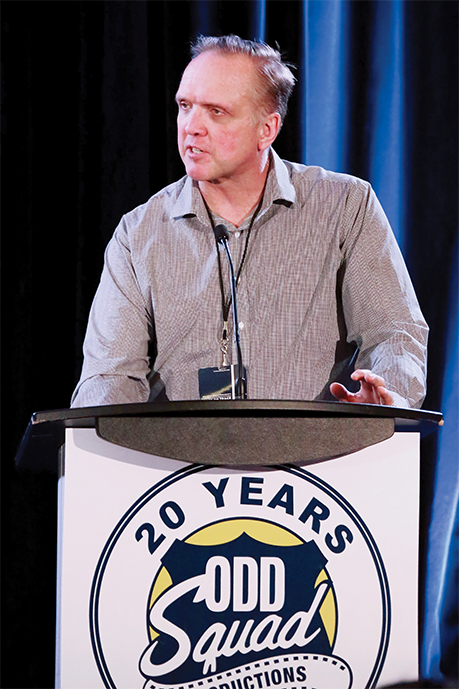 The Odd Squad Production Society tackled two of the biggest drug issues facing youth today at a conference in Vancouver October 19 – marijuana and fentanyl.
The Odd Squad Production Society tackled two of the biggest drug issues facing youth today at a conference in Vancouver October 19 – marijuana and fentanyl.
“The risks of marijuana aren’t any different today than they were before the drug was legalized,” said Mark Steinkampf – a founding member of the 21-year-old non-profit organization and a sergeant with the Vancouver Police Department. “As a plus-50 male who grew up in the 70s, 80s, and 90s I’ve seen a lot of people consume marijuana. As an adult, when your mind is fully formed and you know where you’re at, I don’t have a big issue with it. But don’t tell me and don’t tell parents its okay for kids to consume. The human brain doesn’t finish developing until the mid -20s.”
Steinkampf said that while pot advocates will tell you the drug cures every ailment under the sun and is harmless, in fact research tells us some strains are beneficial for a few ailments such as PTSD, tremors, and some kinds of cancer but there are significant risks with recreational use.
Research tells us heavy marijuana use is very likely a trigger for the onset of mental illnesses including schizophrenia in young people pre-disposed to the issues. Science also tells us that young people with a family history of addiction are more susceptible to becoming addicted to substances themselves.
 “Many can get away with it, but for other kids there is something in their brain that works really well with marijuana and they open that door to addiction and it becomes the focus of their life,” he said.
“Many can get away with it, but for other kids there is something in their brain that works really well with marijuana and they open that door to addiction and it becomes the focus of their life,” he said.
Steinkampf said it is important youth get full information about marijuana, alcohol, tobacco, opiates, fentanyl and other drugs so they can make informed decisions.
“When it comes to youth, we need to encourage them to understand more about the world they live in. When it comes to things like substances they put in their bodies they need to be very careful. Their education should not come from their friends or a person at a marijuana dispensary. Of course they’re going to tell you it’s a good thing because they’re a salesperson.
“It’s all about the money,” he said. “Like many other drugs there are some proven benefits for some applications, but also significant risks. Youth should know about those risks, which are being downplayed because it’s all about money.”
The risks and realities of marijuana was one of a number of related topics tackled at the Odd Squad’s second-annual Back on Track conference in Vancouver October 19. Formed after its founders filmed their first amateur documentary on the streets of the Downtown Eastside in 1997, the Odd Squad has evolved into a non-profit agency that films and produces educational videos for youth and law enforcement agencies and offers peer-to-peer and in-person educational programs to thousands of students, parents, teachers, and community groups in B.C. and across Canada each year. The group also puts on numerous in-person presentations every year, and actively works in gang prevention and exit strategy programs focused on young women.
Another topic discussed at the conference was the launch of the society’s three-part educational documentary series about fentanyl, now available to B.C. schools free of charge. It comes with a supporting resource guide to help teachers present the material.
“Fentanyl is still cutting a significant swath. It’s not slowing down, ”Steinkampf said. On average more than 100 British Columbians die every month from overdoses, many of them from fentanyl. “The emotional toll on first responders, the street workers, is astronomical. On top of that, families of addicts and emergency service providers.”
The three videos focus first on what fentanyl is, the nature of addiction, and why people use it. The second video looks at the impact of the drug, while the final module looks at recovery.
Steinkampf said fentanyl, an artificial opiate, is popular with drug manufacturers and dealers because it is so potent, meaning they need to import only small amounts and then dilute it with other substances.
“Fentanyl is a scary, scary drug,” he said. “For the people who are importing it into Canada, it’s all about money. People can get very wealthy selling Fentanyl because you don’t need the mass amount you do with heroin. If you can get a kilo of fentanyl into Canada you can become a very wealthy individual. They don’t care if people die. They don’t see the user as a person. It’s just a number. It’s all about the money.”
 The artificial opiate is 100 times stronger than the China White heroin that killed so many addicts in the 1990s. It is often diluted into substances like caffeine and then sold as heroin, but the amateur drug dealers doing the mixing often get it wrong, and end up mixing it too strong because they’re just stirring it up in big pots with no controls.
The artificial opiate is 100 times stronger than the China White heroin that killed so many addicts in the 1990s. It is often diluted into substances like caffeine and then sold as heroin, but the amateur drug dealers doing the mixing often get it wrong, and end up mixing it too strong because they’re just stirring it up in big pots with no controls.
The videos follow three families – two who have lost children to the drug, and one with a son who is an addict living on Vancouver’s Downtown Eastside. That boy’s father is a ‘nice guy, a worried, concerned father,” Steinkampf said. The boy had challenges after his mom died when he was young, got involved with a girl who was into oxycodone, experimented himself, and was soon an addict.
“A person experimenting isn’t thinking they’re going to be an addict. They think this feels great, and then it’s too late.”
Steinkampf said the Odd Squad has been advocating for funding directed at education and prevention since it was founded two decades ago.
“The only significant way we can have success in the long term is education and prevention, whether you are talking about marijuana or fentanyl or whatever comes next,” he said. “Harm reduction has its place and is key to helping people get into the care they need to kick their addiction, but if we really want to look after our youth we should focus on keeping them off the drugs in the first place.”
